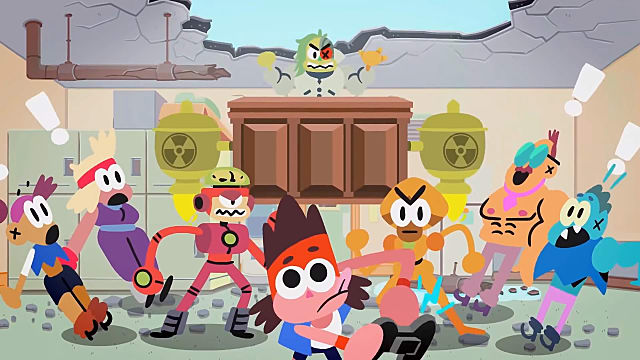

There's a tendency among licensed games -- especially those made for kids --to be shallow, poorly designed, and unoriginal in the name of creating something as fast as possible just to trick fans of the property into buying it. But with Let's Play Heroes, Ian Jones Quartey and Cartoon Network didn't do that. Ian loves his work, his fans, and video games, and decided to do what he could to actually make something mechanically solid, fun, and unique.
What immediately sets OK K.O.! Let's Play Heroes apart from other licensed games is the detailed nature of its conception and development. Cartoon Network has been restructuring the way in which they approach creating games based off their properties, actually taking time for regular development cycles and providing talented studios with reasonable resources, and Let's Play Heroes is one of the first of these projects to be approached with this new direction.
OK K.O.! Let's Play Heroes is an action-RPG adventure game based on the hit Cartoon Network series OK K.O.! Let's Be Heroes, which was developed by Capy Games and recently released on Steam, PS4, and Xbox One by Cartoon Network Games. The show follows a young boy named KO, a bright-eyed optimist with an unbreakable spirit who aspires to become a great hero in a world where everyone has a power level and special powers inside them, and living legends of heroism can work at strip malls in their spare time.
The game follows the show dutifully, feeling often like a series of simple episodes from the show strung together with a loose and free-flowing overarching plot, and everything from the show is faithfully repurposed as in-game locations, enemies, and NPCs. The show's recurring antagonist and salesman of mass-produced evil fighting robots, Lord Boxman, finds a way to reset all the Power Levels of all the POW Cards (trading cards of real people around the world with notable powers and traits) in the Plaza, and KO must accomplish heroic acts in order to restore them to normal as well as raise his own level.
The show's creator Ian Jones Quartey chose to approach Capy Games himself, being a big fan of their work (Superbrothers Sword & Sworcery EP, Super Time Force, etc.), and Capy took to the idea quickly. So we have all the pieces set in place to be a legitimate gaming experience. But the real question is: did it end up being any good, or is it just another mediocre licensed game to add to the bonfire?
Grab some lightning nachos and strap in. Let's Be Critics!
Let's Be Heroes!
Let me just start off this review by saying that this game is miles better than about 90% of other licensed games. That's mainly because it has solid and mechanically sound core gameplay that's inherently fun, and because it clearly had actual hard work put into its presentation and writing -- you know, almost like they were trying to make an actual game.
The gameplay mostly consists of beat 'em up-style combat against enemy robots, and adventure game-style questing and talking to people as you run around the plaza being everybody's favorite good boy. Usually a quest involves talking to a character in the plaza -- usually one of the main characters in the bodega -- and then searching the plaza for an important item or two, getting into a fight, or both.
The combat is surprisingly deep -- though not significantly so, it's still pretty far from something like Odin Sphere, but what the hey -- and actually gives you a decent selection of moves to work with and unlock over time, from uppercuts to throws to crouching maneuvers, and even a surprisingly helpful and skill-reliant dodge move for both the ground and air. The combat reminded me a bit of Viewtiful Joe, in a good way, often allowing the player the options of juggling enemies into other enemies, deflecting enemy projectiles back at them, and managing charging meters throughout the fight.
Pew pew pew pew pew! Take that, Darrell!
The fights may seem a bit long at times, as every enemy has a health bar that's slightly longer than you'd expect of average grunts, but overall the combat is fast-paced enough and has enough options that it isn't a deal breaker. There are also some light RPG elements that slowly unlock new moves for KO as you level up, which works fine, but they aren't really worth elaborating on much for how simple they are. Then, of course, there's all the characters from the show chipping in with their "Powie Zowies."
Throughout the game you can purchase and collect the POW cards of the different citizens of the plaza, all of whom are regular recurring characters from the show, and unlock the ability to summon them in battle to use their special attack, which take a variety of forms. The characters you can end up summoning range from series staples like Rad and Enid to smaller recurring characters like Drupe, Red Action, and even Colewort (no Joe Cuppa, though, unfortunately). You unlock their "Powie Zowies" as the game calls them by completing side-quests for them, which -- once again -- usually involve fighting some bots to find an item or just searching the plaza for that item or buying it in one of the handful of shops.
This aspect of the gameplay takes some slight influence from the Persona games in the fact that you can only help a character with one side-quest per day to make progress on unlocking their Powie Zowie, and have to wait until tomorrow to try another one. Thankfully you can still complete multiple quests for multiple people alongside one main quest at the bodega without wasting time, because the day only officially ends when you choose to end it. Sometimes it can be a bit irritating to see how long it can take for just one hero to warm up to you, but once you've unlocked their Powie Zowie, it's all worth it just to have a new tactic in battle.
The Game's Connection to the Show
A question that must be asked of every licensed game is "does it represent the license well, and do you need to be a fan in order to really get into it?" In the case of Let's Play Heroes, I would say yes and yes.
The game very faithfully follows the show, no doubt due to the show's creators' heavy involvement in its development, and fans of the show should feel right at home right away. The plaza is loaded with familiar faces, all lovingly animated and expressive, and what little dialogue there is for some of them is still representative of each of them.
Every main character from the show is voiced by the usual cast, and the actors actually sound invested in what they say, as if they're just recording for the show like they normally do, which is how it should be. The writing is also very true to the show, often loaded with surprising jokes that come out of left field, nice little nods to past episodes, and in some cases, little mini-arcs for certain characters. I'm happy to admit that this game made me laugh quite a few times.
The style, voice acting, and writing all work together to bring the comedy together.
The animation and visual presentation as a whole deserve special mention. While the game's art style isn't directly consistent with the show's, the simplified lacking-outlines style that they went with is quite interesting too, and I personally like it a lot. Every character has a lovingly detailed and elaborate idle animation when it's just standing around, and without ever having watched one episode of the show, you could probably guess each of their characters just by looking at them.
There's also lots of little details in the presentation that make the whole game feel alive and happily show-accurate. From KO's inexplicably noodle-like arms whenever you buy something to his cute little beatbox tune over the pause menu to the equal parts tranquil and action-oriented soundtrack, the game has a strong personality that feels very OK K.O.!
The game also has a very direct tie-in with the show that affects the gameplay, which I found to be very interesting and well implemented. At random points throughout the show in random episodes -- if you look carefully at the backgrounds -- you can spot a series of three symbol patterns. These are things like dumbbell-bandanna-skull, and remote-skull-heart and stuff like that.
There's one such code down in the corner next to the Cartoon Network logo. Image from the episode "Jethro's All Yours".
If you enter these codes into the in-game POW Card machine, you can unlock secret cards and upgrades that are otherwise unobtainable in-game. You can unlock "Snappy Wappys," which are permanent upgrades for your cards that you can apply to any one card in order to seriously strengthen its Powie Zowie. You can also slowly unlock pieces of cards for special characters that you can't normally unlock in-game.
I personally find this method of directly integrating the game with the show it's based on to be pretty smart. The strength and variety of the already in-game POW cards is by no means too weak or too little, and while the upgrades from the codes are significant, the game is by no means so hard that these bonuses are necessary to get what feels like a balanced or complete experience.
It's all just a big bonus for people who already watch the show, and I think that making a sort of big secret-scavenger hunt for fans of the show to keep in mind as they rewatch old episodes as well as new ones is pretty great cross-promotion. It reminds me of that big contest to win real treasure that surrounded the Swordquest games on Atari 2600, where the players would have to hunt for codes in-game to then cross-reference in a tie-in comic book in order to learn the secret password for the sweepstakes. It's pretty neat stuff.
What Unfortunately Brings the Game Down
While I did enjoy my time with this game and feel that it's still worth the time of fans of the show as well as people looking for a good time, it's unfortunately held back by a few major issues throughout. The biggest ones are the game's overall pacing and how often it repeats itself.
I hate to say it, but for as fun as the combat and the dialogue-driven quests are, they're literally all you're going to be doing for the next few hours. Like I implied earlier, nearly every single quest involves either searching the plaza for an item, beating up Boxmore bots, or both. It doesn't take long for this to get obvious.
The plaza is slowly opened up over time, with a few new areas inside it allowing you access to further quests and exploration options, but this happens at about an hour per area, sometimes more, and you still really never go far from the plaza. While it never really feels like you're doing the same thing over and over, it does feel as though you're doing a very similar thing over and over.
The window dressing and writing around the little mini-quests and even-more-mini quests is nice and varied in theme, but again, ultimately the content of your mission never really changes. Whether you're hunting for a lost golden burrito, counting the number of syllables in the names of a group of people, or trying to convince a self-conscious robot that she should be free to feel confident and dress how she wants (no, seriously), your overall goal is still the same: run around on scavenger hunts and beat up robots.
Not to mention, the game is very stingy with its money. You need it to do basically everything, from buying new packs of pow cards to unlocking new quests to buying items for quests to buying stat boosters to temporarily boost how much you level up in specific stats in battle. This wouldn't be as much of a problem if you got money just a little bit faster, but every coin you earn is few and far between each other.
As funny and well drawn as this screen is, it seriously makes me wonder if Mr. Gar is violating child labor laws with how little he pays KO.
You get paid six technoes at the end of every work day, a quest item usually costs three technoes, and a pack of POW cards costs 10 technoes, and you aren't even guaranteed to get new cards after not too long because duplicates are indeed a thing. After a while you can turn in both duplicates cards -- as well as special computer chips punched out of stunned robots -- into KO's friend Dendy, but it's still not a very fast way of making money regardless.
While it is nice to see a good licensed game that isn't too short for once, the progression model was obviously adjusted to last over a longer period than it had space to comfortably fill, and the slower pace and slowly allotted resources throughout the campaign reflect that. To some people, the repetition and general lack of variety among the main game modes won't be an issue, and can be forgiven if they find the combat fun enough and the quests funny and varied enough in theme, but I can easily see this wearing some people down a bit.
Does This Game "Break the Stigma?"
So in the end, OK K.O.! Let's Play Heroes isn't a masterpiece by any means, nor is it even great, but it's definitely still good. Its greatest advantage is that it was obviously made by people who were actually happy to be working on the project and who had a vision in mind for what they wanted it to be, and then made it because they wanted it to happen.
It may be a licensed game that is probably meant more for children than serious gamers, but it nonetheless plays like an actual game that somebody put time, thought, and genuine effort into rather than yet another cash grab that exists solely to fleece money out of fans like so many others before it. This is what we should take away from this game more than anything.
While this game didn't turn out amazing, the quality and depth of a game it presents is still true to what the show's creators and the people at Capy wanted to do -- break the stigma of licensed games. There have been good licensed games before Let's Play Heroes, and there will be after, but the outspoken crusade by the developers to improve the popular opinion of licensed games, as well as their and Cartoon Network's efforts in the game design itself, gives me hope for a sphere of gaming that's needed a face-lift for quite some time now.
I genuinely hope that the actions of the developers spur even a short-lived renaissance for licensed games. There are so many advantages and untapped potential in adapting an existing property, which Capy clearly realizes, and hopefully in time we can be rid of the phrase "good for a licensed game" and just say "good game."
But for now, on its own merits, OK K.O.! Let's Play Heroes is a fun and solid game that could have been better, ultimately let down by slow pacing in many places and a lack of variety. It's a game that's still fun and enjoyable to those not familiar with the show but still better enjoyed by fans. It's a pretty good time, but maybe wait for a sale if you aren't sure about it. Let's say it's around a 7/10 for non-fans, and closer to an 8/10 for most fans.
OK K.O.! Let's Play Heroes is available now on On Steam, PS4, and Xbox One at the price of $20. Ian Jones Quartey has also said that if the game sells well enough, they may consider porting it to Nintendo Switch as well. You can watch a trailer for the game below:
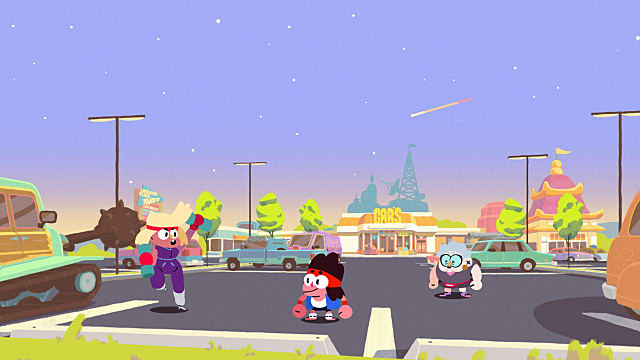
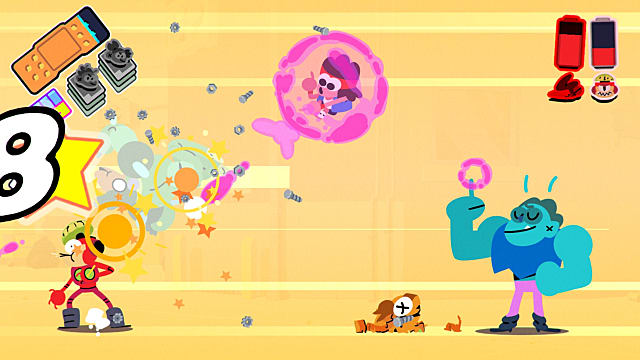
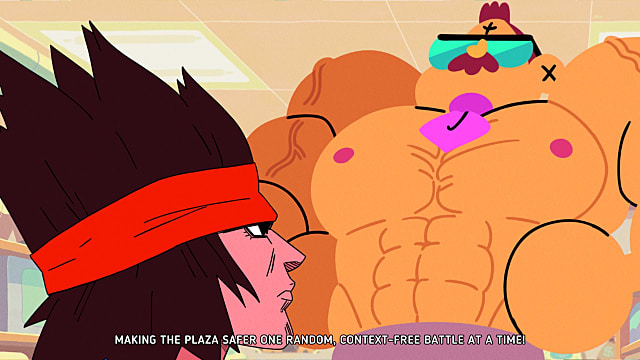
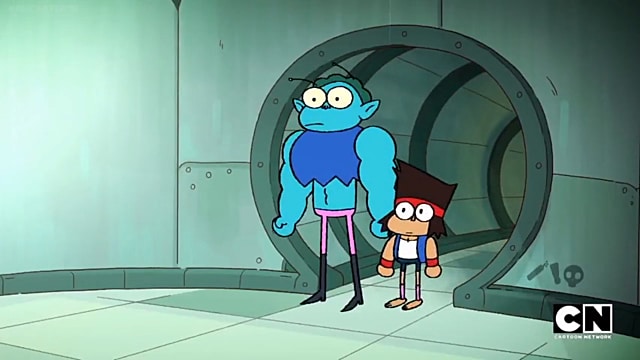
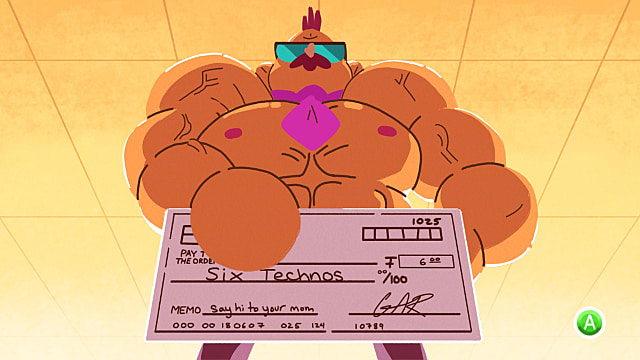
0 comments:
Post a Comment